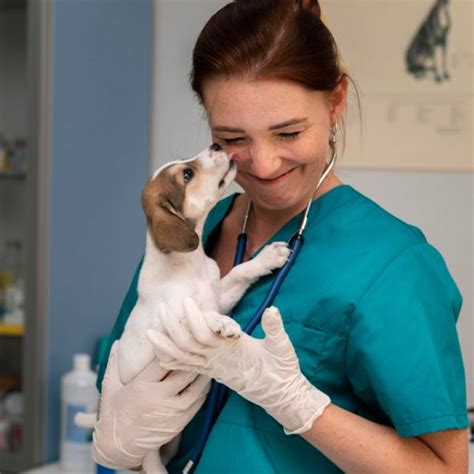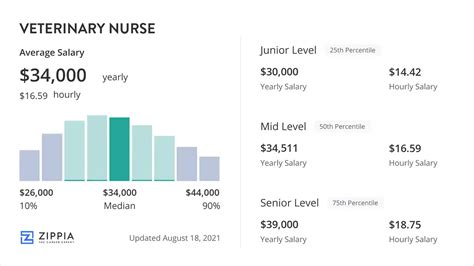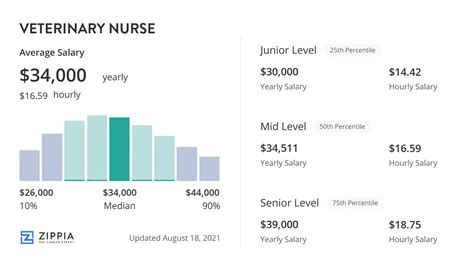For individuals who combine a deep passion for animals with a fascination for medicine, a career as a veterinary nurse is an incredibly rewarding path. But beyond the fulfillment of helping animals live healthier lives, what is the financial potential of this profession? While driven by compassion, prospective and current professionals deserve to know what they can expect to earn.
In the United States, a veterinary nurse's salary typically ranges from approximately $34,000 for entry-level positions to over $60,000 for experienced, specialized professionals. This guide will break down the salary you can expect and explore the key factors that can significantly increase your earning potential.
What Does a Veterinary Nurse Do?

Before we dive into the numbers, it's important to clarify the terminology and the role itself. In the United States, the official professional title is Veterinary Technician (usually with an Associate's degree) or Veterinary Technologist (usually with a Bachelor's degree). The term "Veterinary Nurse" is more common in other countries but is gaining traction in the U.S. through initiatives like the Veterinary Nurse Initiative (VNI) to better align the title with the skill level it represents.
These professionals are the backbone of any veterinary practice. They are skilled medical practitioners who perform a vast range of essential duties, including:
- Administering anesthesia and monitoring patients during surgery.
- Performing dental cleanings and assessments.
- Taking X-rays and other diagnostic images.
- Collecting and analyzing lab samples (blood, urine, tissue).
- Providing sophisticated nursing care for sick and injured animals.
- Educating clients on post-operative care, nutrition, and medication.
- Assisting veterinarians in surgical procedures.
They are the crucial link between the veterinarian, the patient, and the client, requiring a blend of technical skill, medical knowledge, and empathy.
Average Veterinary Nurse Salary

National averages provide a solid baseline for what you can expect to earn in this field. It's important to look at data from multiple authoritative sources to get a complete picture.
According to the U.S. Bureau of Labor Statistics (BLS), the median annual wage for veterinary technologists and technicians was $43,740 in May 2023. The BLS provides a wide salary spectrum:
- Lowest 10%: Earned less than $34,590
- Median (50%): Earned $43,740
- Highest 10%: Earned more than $58,360
Data from top salary aggregators supports this range:
- Salary.com places the median salary for a Veterinary Technician II (with a few years of experience) at around $45,391, with a typical range falling between $38,206 and $53,912.
- Glassdoor reports a total pay average of $44,220 per year based on user-submitted salary data.
- Payscale notes an average base salary of approximately $40,000, highlighting a clear progression in pay based on years of experience.
These figures confirm that while the starting salary may be modest, there is clear potential for growth as you gain skills and experience.
Key Factors That Influence Salary

Your salary is not a fixed number. It is a dynamic figure influenced by several critical factors. Understanding these variables is the key to maximizing your earning potential throughout your career.
### Level of Education
While a two-year Associate of Applied Science (A.A.S.) degree from an American Veterinary Medical Association (AVMA)-accredited program is the standard requirement to become a credentialed veterinary technician (CVT, RVT, or LVT depending on the state), pursuing a four-year Bachelor's degree to become a veterinary technologist can open doors to higher-paying roles. A Bachelor of Science (B.S.) degree often provides a deeper understanding of advanced scientific principles, making graduates ideal candidates for positions in:
- Research facilities
- Pharmaceutical companies
- Veterinary school teaching hospitals
- Management and leadership roles within large clinics
These positions typically command higher salaries than general clinical practice.
### Years of Experience
Experience is one of the most significant drivers of salary growth. As you transition from a new graduate to a seasoned professional, your speed, efficiency, and ability to handle complex cases increase, making you a more valuable asset to your employer.
- Entry-Level (0-2 years): New graduates can expect a salary in the $34,000 to $39,000 range as they build their foundational skills.
- Mid-Career (3-9 years): With solid experience, technicians can expect to earn closer to the national median, typically from $40,000 to $48,000.
- Experienced/Senior (10+ years): Highly experienced technicians, especially those who have taken on training or supervisory responsibilities, can earn $50,000+, with specialists earning even more.
### Geographic Location
Where you work matters. Salaries for veterinary nurses vary significantly by state and even by metropolitan area, largely due to differences in the cost of living and demand for advanced pet care.
According to the BLS, the top-paying states for veterinary technicians are:
1. District of Columbia: $67,030 (mean annual wage)
2. Washington: $55,480
3. California: $55,100
4. Connecticut: $54,920
5. New York: $53,490
Working in a major urban or suburban area will almost always yield a higher salary than practicing in a rural community.
### Company Type
The type of facility you work in has a direct impact on your paycheck. While private companion animal clinics are the most common employers, some of the highest-paying jobs are found elsewhere.
- Research Laboratories and Universities: These institutions often pay at the top of the scale due to the specialized nature of the work and the need for meticulous, highly skilled technicians. The BLS confirms that "Scientific Research and Development Services" is one of the top-paying industries for this profession.
- Emergency and Specialty Hospitals: These 24/7 facilities require technicians to have advanced skills in areas like critical care, surgery, or internal medicine. The high-stress environment and need for specialized expertise often result in higher pay and shift differentials for overnight work.
- Government and Industry: Positions with pharmaceutical companies, animal food manufacturers, or government agencies like the USDA offer competitive salaries and excellent benefits.
### Area of Specialization
Perhaps the most powerful way to increase your salary is to become a Veterinary Technician Specialist (VTS). A VTS is a technician who has achieved a high level of expertise in a specific discipline, recognized by the National Association of Veterinary Technicians in America (NAVTA).
Achieving this credential requires years of dedicated experience, extensive case logs, and passing a rigorous examination. However, the reward is significant, both professionally and financially. VTS-certified professionals are in high demand and can command salaries well over $60,000, with some earning upwards of $75,000.
Popular VTS specializations include:
- Anesthesia and Analgesia
- Emergency and Critical Care (ECC)
- Dentistry
- Internal Medicine
- Surgery
- Zoological Medicine
Job Outlook

The future for veterinary nurses is exceptionally bright. The BLS projects that employment for veterinary technologists and technicians will grow 21% from 2022 to 2032, which is much faster than the average for all occupations.
This incredible growth is fueled by several trends:
- A growing pet population in the U.S.
- Pet owners' willingness to spend more on advanced medical care for their animal companions.
- The increasing sophistication of veterinary medicine, which requires more skilled support staff.
This high demand creates strong job security and upward mobility for dedicated professionals in the field.
Conclusion

A career as a veterinary nurse offers a unique blend of emotional reward and professional stability. While starting salaries are moderate, this is a field with a clear and attainable path to significant financial growth. By focusing on continuous learning, gaining valuable experience, and considering specialization, you can build a financially secure future while doing the work you love. For those looking to enter a growing, in-demand healthcare field dedicated to animal welfare, the career of a veterinary nurse is an excellent and promising choice.
